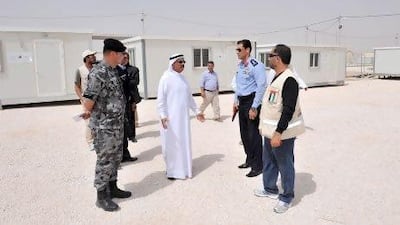ABU DHABI // A long-awaited UAE-funded Syrian refugee camp will open in Jordan this week.
The Emirati-Jordanian camp will be built in the Meraijeb Al Fahoud area to help accommodate the overwhelming influx of refugees crossing the border daily, overcrowding the current Zaatari camp.
The situation caused the UN to urge new camps to be set up, and the UAE was one of the first countries to offer to build one lastSeptember. It was to be constructed with cement floors to eliminate the possibility of mud floods, such as the ones experienced at Zaatari earlier this year.
The UAE also promised that homes would be in caravans rather than tents to keep families warm.
Approval from the Jordanian government was not easy to come by but earlier this year, Jordan gave the UAE the green light to build the camp, and construction has moved at a fast pace to complete the first phase.
When it opens, the camp will have 770 caravans, stores, kitchens, a school for girls and another for boys, a mosque, outdoor and indoor markets and integrated health units, the state news agency Wam reported yesterday.
The camp will also have a water treatment station with a total capacity of 500 cubic metres per day, solar-powered heaters, a modern irrigation system and family entertainment zone that will include playgrounds for children.
Andrew Harper, a representative of the United Nations High Commissioner for Refugees, has visited the site.
"It's a five-star refugee camp," he said yesterday. "It has everything a refugee would want and more. We look forward to opening it."
Since only the first phase of the camp is to open, Mr Harper said the UN looked forward to the facility growing to accommodate a larger number of refugees.
"It is still quite a small camp," he said. "I look forward to its expansion." He said the Zaatari camp housed more than 100,000 refugees but was designed to give shelter to far fewer.
"We definitely need several new camps, and as soon as possible," he said. "Numbers are large."
An average of 2,000 people now cross the border each night. Mr Harper said that 2,000 came across on Thursday and 2,300 crossed the night before because of continued fighting in Deraa.
Some refugees had returned after fighting had calmed in their hometowns after finding how uncomfortable the Zaatari camp was, he said.
"This is a very welcome engagement by the UAE," he said. "We need more."
While unsure when the camp would officially open, Abdullah Nasser Al Ameri, the UAE Ambassador to Jordan, said it would be ready to receive its first batch of refugees on April 10, according to Wam. The ambassador has taken a tour of the camp to inspect final arrangements and food, educational, housing, health and recreational facilities.
"Preparations have completed to receive the first group of refugees," said Majed Sultan bin Sulaiman, head of the UAE relief team.
About Dh12 million has been spent on the camp. Its management will be separate from the team running Zaatari.
Running the site will cost the Red Crescent Dh225m a year. It is still unknown how the camp plans to operate.
"We are talking to the UAE to determine the criteria," Mr Harper said. "We just want people moved."
Earlier this year the UAE pledged an additional Dh1.1 billion at the International Donors Conference for Syria held in Kuwait, where it was the joint-largest donation along with offers from Saudi Arabia and Kuwait.
While the UAE would be entirely responsible as to how the money would be used, Mr Harper said involving the UN would benefit all parties involved.
"We are still expecting some [funding] from the UAE," he said.
But others have been slow to make good on their pledges, he added.

